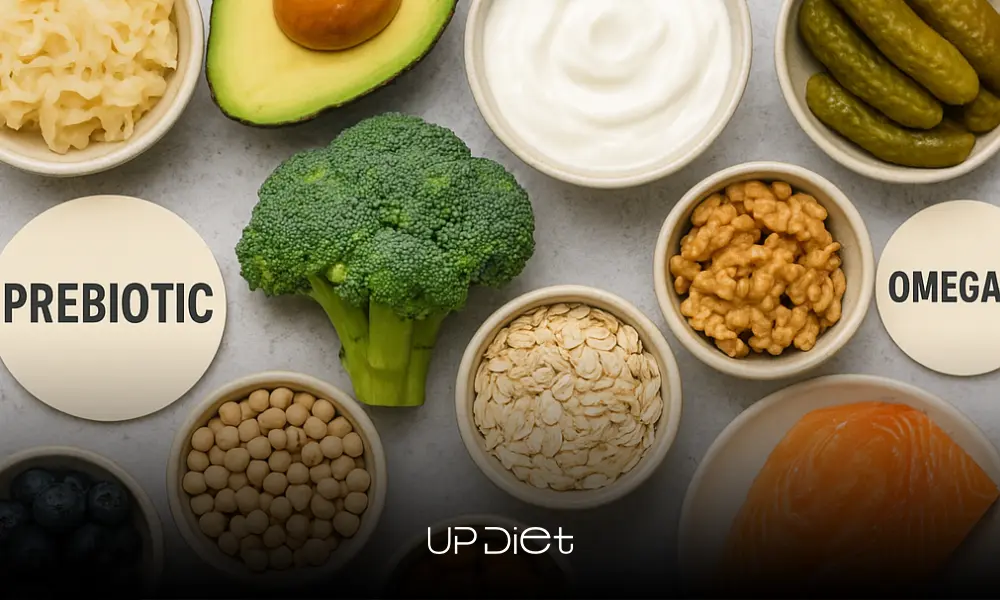Get a plan made for your unique body and goals
Gut Microbiome Diet and Leaky Gut: Foods That Heal and Nourish
.psd%20(4).webp&w=3840&q=75)
The human body is constantly exposed to a wide range of substances, some of which are beneficial and others that are potentially harmful. Under normal circumstances, a well-functioning intestinal barrier prevents these substances from entering the bloodstream. However, factors such as stress, poor dietary habits, and prolonged antibiotic use can disrupt the gut microbiome balance and weaken the intestinal barrier, leading to increased intestinal permeability, commonly referred to as leaky gut. This may lead to digestive disturbances, nutrient malabsorption, autoimmune reactions, and other health issues. Following a gut microbiome diet and ensuring proper gut nutrition can help restore this balance, support the repair of the intestinal barrier, and promote overall digestive health.
Understanding the influence of diet on the interaction between the gut microbiome and the host immune system is crucial for developing nutritional strategies that support gut health and maintain gut nutrition. In this article, we highlight the role of nutrients and healing foods, focusing on how a healthy diet may strengthen the intestinal barrier and support a gut bacteria diet.
What is the Gut Microbiome and Leaky Gut?
The gut microbiome is a diverse collection of millions of different microorganisms, including bacteria, that naturally reside in the human gut and are responsible for vital metabolic, immune, and nutritional functions. The Gut microbiome plays a crucial role in human health and disease, helping to maintain the integrity of the intestinal barrier. Under normal conditions, this barrier prevents the passage of pathogens, pro-inflammatory substances, and antigens into the internal environment and bloodstream.
However, certain factors, including an unhealthy diet, antibiotics, medications, and pathogens, alter the gut microbiome, weaken the intestinal barrier, and increase the permeability of the intestinal wall, a condition known as leaky gut. In this case, substances pass through the intestinal wall and enter the bloodstream, inducing inflammation all around the body and causing various diseases.
Why Nutrition Matters for Gut Health?
Food components in our diet not only supply essential nutrients to the body but also serve as fuel for the gut microbiome in the gastrointestinal tract. In this way, diet has a strong influence on the diversity, composition, and activity of the microbiome, which is crucial for gut health and nutrition, and interacts with the intestinal epithelium and immune system to maintain gut balance and health.
When diets are poor or unbalanced, the result can be a reduction in microbial diversity and the development of dysbiosis. Dietary components can significantly alter gastrointestinal functions, compromising the integrity of the intestinal barrier. In contrast, a nutritionally balanced diet is crucial for maintaining a healthy gut microbiome, the integrity of the intestinal barrier, immune tolerance, and normal gut physiology—all of which are essential aspects of gut health nutrition.
Best Foods for Gut Microbiome
Since diet plays a crucial role in the development of leaky gut and various other diseases, choosing foods that strengthen the intestinal barrier and have anti-inflammatory properties for the gut microbiome is essential.

Conversely, foods that may further irritate the intestines should be avoided. A nourishing leaky gut diet includes Gut-healing foods that promote a healthy and nurturing gut:
- Probiotics are viable microorganisms that exhibit physiological and beneficial therapeutic effects. Probiotics are found both in foods and as supplements. A probiotic-rich diet includes fermented foods that naturally contain live beneficial bacteria. Examples of foods rich in probiotics include kefir, yoghurt, pickled vegetables such as sauerkraut, tempeh, kimchi, and certain types of cheese. They improve digestion, boost immune function, maintain a healthy balance of gut bacteria, reduce inflammation in the gut, and may also have additional beneficial effects on overall health. Including these foods in your leaky gut diet can be particularly helpful.
- Prebiotics are dietary compounds that stimulate the growth and activity of beneficial bacteria in the gastrointestinal tract. These are found in foods such as certain vegetables (including garlic, chicory, onion, artichoke, and asparagus), bananas, avocado, and grains like rye and corn, all of which foster a thriving gut microbiome.
These prebiotics are fermented by the bacteria present in the gut, producing short-chain fatty acids. These short-chain fatty acids provide membrane integrity of the intestine and enhance mineral absorption, lower body weight, and improve immunity.
- Fiber-rich foods are beneficial for overall health and digestion, as they help increase the number and diversity of gut bacteria, thereby enhancing immune function. Good sources of fiber include whole-grain cereals, vegetables, fruits such as apples and berries, nuts, seeds, beans, and lentils. These foods have anti-inflammatory properties and support the health of intestinal cells.
- Omega-3 fatty acids have anti-inflammatory qualities that are abundant in fish species. We can also obtain small amounts from foods like nuts and seeds (Such as Walnuts, flaxseeds, and chia seeds), as well as oils like Canola and soybean. These fatty acids can alter the composition of the gut microbiome, promoting the growth of beneficial bacteria and reducing gut inflammation.
Foods to Avoid for Leaky Gut
To maintain a healthy gut, it's essential to avoid certain foods. High-fat meals, sugars, additives, and ultra-processed items can disrupt the gut microbiome, leading to inflammation and digestive problems. Additionally, spicy foods, excessive caffeine, and alcohol can irritate the gastrointestinal tract, leading to discomfort and harm to the gut lining and digestive issues. Alcohol can cause loss of intestinal barrier function by extracting and dissolving intestinal mucosal lipids, which are a critical component of intestinal barrier function.

But People who experience unpleasant gastrointestinal symptoms may want to avoid eating foods like FODMAPs. These are short-chain carbohydrates that bacteria break down or ferment. This fermentation process produces gas, which causes uncomfortable symptoms such as bloating and flatulence. Adopting a low-FODMAP diet may reduce gas production, which in turn may help alleviate the digestive discomfort associated with leaky gut syndrome.
High FODMAP foods to avoid for People who experience unpleasant gastrointestinal symptoms include:
- fruits such as apples, cherries, peaches, pears, goji berries, dates, and watermelon
- vegetables, including asparagus, mushrooms, onions, and garlic
- legumes, such as black beans, fava beans, kidney beans, and chickpeas
- natural and artificial sweeteners, including fructose, honey, xylitol, sorbitol
- grains such as wheat, flour, barley, rye, and almond meal
- beverages, including soda, fruit juice, beer, and wine
How to Eat for Healing
You can improve and reset your gut health through lifestyle and diet changes. Scientific evidence suggests that combining probiotics, prebiotics, fiber-rich foods, proper hydration, and mindful eating habits can enhance microbiome diversity and promote digestive health. Here are step-by-step tips for improving your gut health naturally:
- Take probiotics and prebiotics: Consume fermented foods such as probiotic yogurt, kefir, sauerkraut, kimchi, and miso, as well as fiber-rich foods like garlic, onions, leeks, asparagus, bananas, and whole grains to nourish good bacteria and maintain a balanced gut microbiome.
- Stay hydrated: Adequate water intake supports digestion, helps maintain the mucosal lining, and aids fiber function. Staying hydrated benefits your health overall and can help prevent constipation.
- Increase dietary fiber: Aim for a variety of soluble and insoluble fibers (vegetables, fruits, legumes, whole grains) to enhance microbial diversity and regulate bowel movements.
- Practice mindful eating: Eat slowly, chew thoroughly, and manage stress, as gut-brain interactions significantly affect digestion and microbiome balance.
- Limit gut irritants: Reduce ultra-processed foods, added sugars, artificial sweeteners, and excessive alcohol, which disrupt the microbiome and intestinal barrier.
Nutrition and Gut Health Benefits
The composition of the gut microbiome plays a central role in immune regulation and overall health. Nutrition and gut health are closely linked, as diet is one of the most critical factors shaping this microbial ecosystem, influencing its diversity, stability, and activity. A nutrient-rich diet that includes fruits, fiber, prebiotics, and probiotics supports a balanced gut microbiome, strengthens the intestinal barrier, and reduces inflammation. For example, vitamins and antioxidants, such as vitamin C, have been shown to reduce gastrointestinal oxidative stress, thereby enhancing immune responses and promoting gut integrity. Besides improving gut health, a healthy, fruit-based diet can help reduce the occurrence of chronic diseases, such as diabetes, cardiovascular disease, and inflammatory disorders.
Focusing on nutrition and gut health, Gut healing foods also improve digestion, reduce bloating, and enhance energy levels. Prebiotics and probiotics foster the growth of beneficial bacteria that ferment dietary fibers into short-chain fatty acids (SCFAs). These metabolites improve intestinal barrier integrity, regulate gas metabolism, and alleviate bloating. Thus, a gut-friendly diet not only strengthens the immune system but also supports better digestion and sustained energy throughout the day.
Final thoughts
Caring for your gut is an investment in long-term health. By choosing nutrient-rich, gut-friendly foods, you can strengthen your intestinal barrier, support your immune system, improve digestion, and maintain consistent energy levels, all of which contribute to enhanced health.
- In this post:
- What is the Gut Microbiome and Leaky Gut?
- Why Nutrition Matters for Gut Health?
- Best Foods for Gut Microbiome
- Foods to Avoid for Leaky Gut
- How to Eat for Healing
- Nutrition and Gut Health Benefits
- Final thoughts



